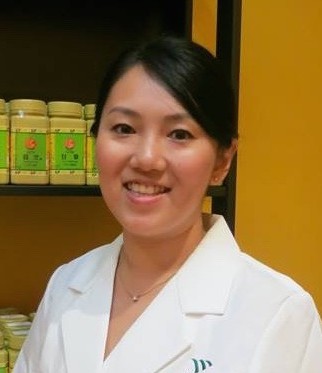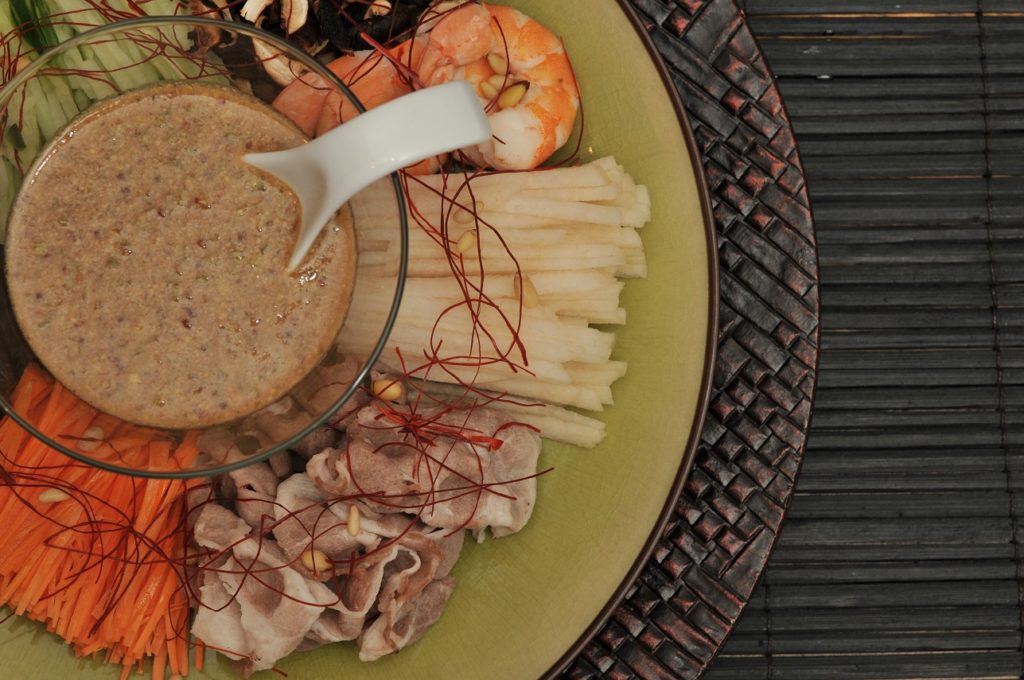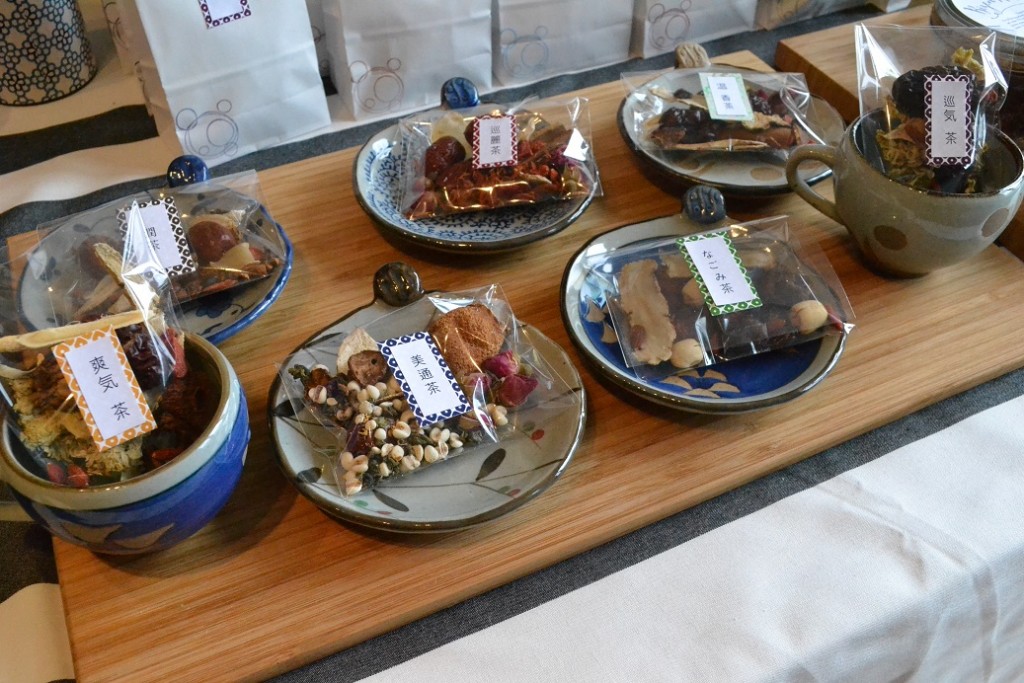What is Anti-aging? Oriental Medicine and Medicinal Cooking (Part 2 of 2)
By Yuki Minesaki, Registered Acupuncturist and Registered Traditional Chinese Medicine Practitioner
 This is the 2nd half of the article “What is Anti-aging? Oriental Medicine and Medicinal Cooking”, published in the May 2015 Issue of the JSS Online News. You can see the 1st half of this article by clicking here.
This is the 2nd half of the article “What is Anti-aging? Oriental Medicine and Medicinal Cooking”, published in the May 2015 Issue of the JSS Online News. You can see the 1st half of this article by clicking here.
The Key is “Hojin / Strengthening your Kidneys”
In Oriental medicine, menopause and symptoms of aging are seen as a “reduced function of so-called Jin(腎)”.
According to oriental medicine, Jin (腎) or Kidneys, are different from kidneys in western medicine. Jin refers to the body functions, which are sources of energy in people. It refers to things such as hormones, urinary, reproductive and immune systems. Jin (Kidneys) stores the source of life energy, as well as being the basis for development, physical growth and reproduction. It also has a function of managing body moisture and urine excretion.
Jin or Kidneys are also said to nurture the brain, bones and hair. Therefore, if it is weakened, one is likely to experience osteoporosis, lower back pain, knee pain, gray hair, weakened teeth or dementia. In addition to that, there is a feature called “Nouki (納気)”, such that Jin or the kidneys supports the lungs for breathing and inhaling oxygen deep into the body. When this function is weakened, one is likely to experience breathlessness or shallow breath.
The saying that “Jin opens holes in the ears and the two yins” shows that it maintains the functions of the ears, urethra, reproductive organs and the anus. Symptoms such as tinnitus, hearing loss, or trouble with urination and defecation are due to the dysfunction of Jin. These possible symptoms caused by reduced Jin function are commonly seen as signs of aging. By strengthening the Jin or Kidneys, you can dispel these symptoms and slow the process of aging.
As the human body is maintained by balancing yin and yang, Jin has both yin, which mainly controls moisture in the body, and yang, which makes the body warm. It is important to identify which of the features are more weakened and balance yin and yang with Chinese medicine, medicinal meals or acupuncture according to one’s physical constitution, condition and lifestyle.
 Dietetics to make the Jin or Kidneys healthy
Dietetics to make the Jin or Kidneys healthy
Typical foods that strengthen Jin include; nuts (pine nuts, mulberry, goji berries or walnuts), food that are black in colour (black beans, black rice, cloud-ear fungus, black sesame seeds or seaweed), food which has stickiness and astringency (yam, glutinous rice, lotus seeds, ginkgo and oysters), food that are temperature resistant (lamb, beef, chicken, shrimp, ginger, cinnamon, leek), salty food (seaweed, especially laver or kelp, and sea cucumber).
If you have symptoms of “heat” such as hot flashes, night sweats, dizziness, tinnitus, dry skin, back pain, constipation or have a red tongue with less ‘fur’, you may have a type of moisture shortage called “Jininkyo” or “Kidney Yin Vacuity”.
People who have symptoms of “Kidney Yin Vacuity” are advised to ensure high-quality sleep, go to bed before midnight, try to eat more foods that are coloured black and red (tomatoes, beets or wolf berries), and eat foods to strengthen the blood (spinach or day lily). Soy milk, pork, squid, oysters, yams, cloud-ear fungus, pears, peaches, grapes and walnuts are also foods, which ameliorate your yin. Avoid activities, which drain your blood such as overuse of the computer, watching TV for too long or staying up late.
On the contrary, people who have symptoms such as a cold waist, arms, and feet; frequent urination; insomnia; fatigue or malaise; shortness of breath; and a pale tongue with white ‘fur’ might lack function for warming their body which is called “Jinyokyo” or “Kidney Yang Deficiency”.
For people with Kidney Yang Deficiency, it is important to keep from cooling the body. Use a disposable heating pad or warmer to keep your lower abdomen and waist warm. It is also important not to eat foods, which cool your body. Lamb meat has been known to warm the body. This is perhaps why Hokkaido is famous for “Genghis Khan”, a lamb dish. Use spices such as garlic, ginger and green onions, which make the body warm.
Sometimes people experience hot flashes and cold body at the same time due to insufficiency of both yin and yang. Since yin and yang are easily interchangeable, there are many people who have both symptoms of “Kidney Yin Deficiency” and “Kidney Yang Deficiency”. If one is weakened, it will affect the other.
Seasons will also affect one’s type of yin and yang. In any case, increasing the functions of the Jin or kidneys leads to anti-aging. For prevention of aging, I recommend you implement a diet that makes your kidneys healthier as early as possible.
In addition to diet, there are ways to strengthen the Kidneys with little effort. As I explained above, the kidneys help to bring oxygen deep into the body. By abdominal breathing, you will be able to strengthen the “Nouki(納気)” or breathing function of the kidneys. Try slow abdominal breathing for one or two minutes a day. By continuing this short exercise, you will notice changes in your physical condition.
It is also important to strengthen your waist, where the kidneys are located, by bending and stretching. There is a pressure point under the sole of the foot called “Yusui” which is effective for kidneys. I recommend you to step on a bamboo stepper to stimulate the sole of the foot or massage the “Yusui” point.
It is also important to work on brain training. Try to give a stimulus to the brain by using your fingers, massaging the scalp, memorizing or doing arithmetic on a daily basis.
In addition, cold is the enemy of the kidneys. According to the Chinese Five Elements Theory, winter is the season that affects Jin or the kidneys the most. Although it is warm right now, cooling your body by using air conditioning is ill-advised. Keep your feet and waist warm to support your kidneys.
I hope you see that not only taking care of your body on the outside, but also keeping your internal organs healthy will lead to healthy, radiant skin. If these suggestions do not dispel your symptoms, or you need an easier way to strengthen your kidneys, you can try acupuncture or Chinese medicine.
Nevertheless, kidneys are not the be-all and end-all of health. It is important to assess which meridians and organs have upset the balance of the body in the concept of Oriental medicine. There are ways to dispel your symptoms by using acupressure or Chinese medicine.
If you experience physical discomfort while you keep yourself fit by using dietetics, stretching and breathing, I would recommend you to consult with experts in Oriental medicine. There are a lot of tips for smart aging in the Oriental medicine regimen. Use these tips. Let’s get older the smart way!

